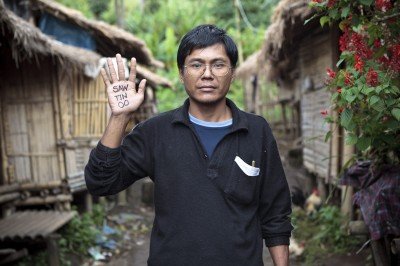Activist groups re-launched a photograph campaign on Sunday calling for the release of the remaining political prisoners in Burma. The start of the three-day event coincided with Burma’s Independence Day and a related protest staged by members of 22 activist groups at Maha Bandoola Park in downtown Rangoon.
Protestors – who also called for amendment of the 2008 Constitution and return of confiscated farmland – held up placards and displayed photographs, which depict portraits of former political prisoners with the names of their jailed comrades scrawled on the palms of their hands.
“It’s a message to those in prison that we are trying our best,” said Bo Gyi, a former political prisoner and joint secretary of the Assistance Association for Political Prisoners in Burma (AAPP-B), which helped initiate the photo project five years ago. “We want to give the message to the international community that this issue is not finished yet, and we must put more pressure on the government to release people at once.”
The photos were also distributed on Facebook and other social media by the Former Political Prisoners Organisations (FPPO) and the AAPP. British documentary journalist James MacKay initiated the original campaign with the help of AAPP and DVB, and a first exhibition was held at Amnesty International’s London headquarters in June 2010.
The AAPP describes the photos’ message as: “Even though I am free, I am not”, a reference to the solidarity between all political prisoners past and present and the engagement of activists in the struggle for political freedoms and basic human rights.
Although many prisoners have been released in general amnesties over the past few years, the AAPP claims that the number of prisoners of conscience has increased, even though government officials do not recognise their status as such.
A Political Prisoner Scrutiny Committee was set up in February 2013 to be an official government body charged with defining the term “political prisoner” and identifying inmates who meet the criteria. However, Bo Gyi, a member of the committee, said he doubts the government’s sincere interest in the committee’s work.
“Even though I am one of the members of the committee, I don’t know when the government will call for us to meet,” he said. “I sent a letter last month to inquire, and I did not receive a reply.”
[related]
Currently, AAPP says, 159 political prisoners, including journalists, farmers and activists remain in Burmese prisons, while 203 people, as well as hundreds of farmers, are facing trial charged with various offences stemming from their fight for rights.
Bo Gyi pointed out, however, that while bringing down the numbers of the wrongly imprisoned is a top priority, he hopes the photo campaign will help people focus on the underlying issue of establishing rule of law, basic human rights, and political and press freedoms in Burma.
“Sometimes people are only thinking about numbers, and they don’t see it,” he said. “I’m thinking, ‘What is press freedom? What is political freedom? What are the basic human rights and rule of law, arbitrary detention and torture?’”
He forecast a grim picture for 2015 in terms of wrongful arrests in the run-up to general elections, slated for late October or November. “The government is preparing to win [the election] again, but they know if they do things really honest and simple, they will lose. So what they know to do is to do fraudulent things, to crack down, to arrest. They don’t know more than that.”
In July 2013, President Thein Sein told an audience in London that there would be no prisoners of conscience in Burma by the end of that year. DVB contacted Information Minister Ye Htut for comment on the failure so far to meet this promise but has not yet received a response.



